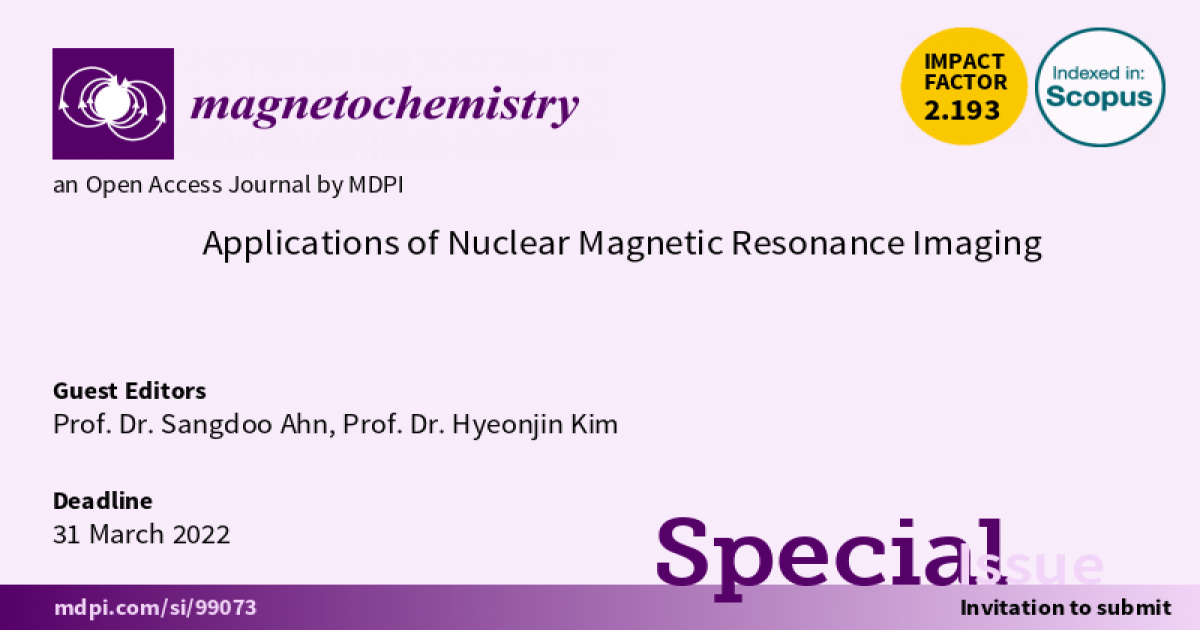Applications of Nuclear Magnetic Resonance Imaging
A special issue of Magnetochemistry (ISSN 2312-7481). This special issue belongs to the section "Magnetic Resonances".
Deadline for manuscript submissions: closed (31 March 2022) | Viewed by 454

Special Issue Editors
Interests: nuclear magnetic resonance; magnetic resonance imaging; solution NMR theory and applications; diffusion NMR
Special Issue Information
Dear Colleagues,
Nuclear magnetic resonance imaging, commonly called magnetic resonance imaging (MRI), has developed into an indispensable imaging device for medical diagnosis and various research fields since it was introduced in the 1970s. This is due to advances in MRI hardware (e.g., magnet, coils, computer) and software (e.g., pulse sequence, data processing) along with MRI’s unique advantage of providing desired cross-sectional and three-dimensional images with excellent soft-tissue contrast without physical incision or radiation exposure.
MR spectroscopy (MRS; a.k.a. in vivo NMR) has also been benefiting from the advances in MRI hardware for the more accurate and rapid non-invasive extraction of biochemical information from various organs. By combining MRS with the spatial encoding technique in MRI, MR spectroscopic imaging (MRSI; a.k.a. chemical shift imaging (CSI)) provides a unique means of non-invasively mapping multiple metabolites simultaneously over the entire section or volume of a living organ. Given its recent remarkable accomplishments in a variety of different tasks, deep learning has also been applied in MRI and demonstrated its potential in the advancement of MRI techniques, including but not limited to undersampled MRI reconstruction, contrast synthesis, segmentation, diagnosis, and automated scan preparation.
This Special Issue focuses on the latest developments and applications of nuclear magnetic resonance imaging. We invite researchers to contribute original research or review articles to this Special Issue.
Prof. Dr. Sangdoo Ahn
Prof. Dr. Hyeonjin Kim
Guest Editors
Manuscript Submission Information
Manuscripts should be submitted online at www.mdpi.com by registering and logging in to this website. Once you are registered, click here to go to the submission form. Manuscripts can be submitted until the deadline. All submissions that pass pre-check are peer-reviewed. Accepted papers will be published continuously in the journal (as soon as accepted) and will be listed together on the special issue website. Research articles, review articles as well as short communications are invited. For planned papers, a title and short abstract (about 100 words) can be sent to the Editorial Office for announcement on this website.
Submitted manuscripts should not have been published previously, nor be under consideration for publication elsewhere (except conference proceedings papers). All manuscripts are thoroughly refereed through a single-blind peer-review process. A guide for authors and other relevant information for submission of manuscripts is available on the Instructions for Authors page. Magnetochemistry is an international peer-reviewed open access monthly journal published by MDPI.
Please visit the Instructions for Authors page before submitting a manuscript. The Article Processing Charge (APC) for publication in this open access journal is 2700 CHF (Swiss Francs). Submitted papers should be well formatted and use good English. Authors may use MDPI's English editing service prior to publication or during author revisions.
Keywords
- nuclear magnetic resonance imaging
- magnetic resonance imaging (MRI)
- MRI hardware
- MRI pulse sequences
- MRI acquisition techniques
- MRI data processing techniques
- MRI applications
- MR spectroscopy techniques
- MR spectroscopy applications
- functional MRI
- artificial intelligence in MRI and MR spectroscopy
- deep-learning-based MRI and MR spectroscopy





